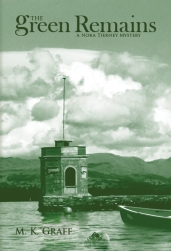Auntie M has already sung the praises of authors S. J. Bolton and Julia Spencer -Fleming. Here are reviews of their newest I’ve gotten my hands on, coupled with a new writer for your attention:
First, Julia S-F has hit the ground running with the latest entry in her series featuring Episcopal priest, Rev. Clare Ferguson and her sheriff lover, Chief Russ Van Alstyne. Their romance has been handled delicately through past books, and hits its stride here in One Was a Soldier. (The title happens to be a line from one of Auntie M’s favorite hymns.)  Rev. Clare is an accomplished helicopter pilot, and has just returned from combat duty in Iraq. She finds herself one of five veterans attending a counseling group, each one carrying the baggage and problems active duty brings. The vets struggle with drug dependency, explosive rage, brain injuries and the guilt of an in-country affair. One young track star grapples with adjusting to facing life as a double amputee. The ravaging effects of war are handled here with understanding and compassion. And then murder rears its head, and a conspiracy is feared which may affect them all. This takes place as Russ and Claire try to iron out their complicated relationship. Satisfying and complex.
Rev. Clare is an accomplished helicopter pilot, and has just returned from combat duty in Iraq. She finds herself one of five veterans attending a counseling group, each one carrying the baggage and problems active duty brings. The vets struggle with drug dependency, explosive rage, brain injuries and the guilt of an in-country affair. One young track star grapples with adjusting to facing life as a double amputee. The ravaging effects of war are handled here with understanding and compassion. And then murder rears its head, and a conspiracy is feared which may affect them all. This takes place as Russ and Claire try to iron out their complicated relationship. Satisfying and complex.
Next up is Now You See Me from S. J. Bolton, whose stand-alone thrillers just keep getting stronger. Bolton’s fascination with British folklore has made all of her novels a treat for readers. This time Bolton and her protagonist, newly-minted detective Lacey Flint, take on a Jack the Ripper-like killer, hellbent on recreating some of London’s bloodiest past. The opening hooks you: seconds after interviewing a reluctant witness in a different case, Lacey finds a viciously stabbed woman hanging onto her car door. The woman has been brutally stabbed and literally dies in Lacey’s arms. This strong beginning doesn’t let up, and you will be turning pages quickly as the murders mount, all with ties of some sort to the original Ripper killings. Once Lacey’s name is mentioned in the killer’s letter to a reporter, she becomes irrevocably linked to the investigation.
As the killer taunts Lacey with his cruel game, she comes under the close scrutiny of two members of her team: DI Dana Tulloch, reassigned from her Scotland post and carrying her own demons, and Special Ops officer DI Mark Joesbury, who finds himself assigned to guard Lacey when it becomes apparent this killer has made it personal. As the investigation heats up and the bodies start to pile up, Lacey finds too many reminders of a part of her own life she’s kept hidden from everyone who knows her, including the police force. The pacing is relentless, and even when Lacey offers herself as bait for the killer and you think you know the ending, it twists away from you on a different course. Fast-paced and riveting.
The newcomer to this grouping is A. D. Scott, living now in Australia, but raised in the Scottish Highlands. Scott uses all five senses to make the area so real it jumps off the page in her debut A Small Death in the Great Glen.
Scott deftly brings her readers into 1950’s Scotland, where WWII is still on most residents minds. That includes the varied staff of a small town newspaper who we visit in turn, and whose actions push the story forward. After his disappearance, a young boy’s body is found drowned in the canal, and when murder is decided, panic threatens to overtake the villagers.
Threads of religious intolerance, petty jealousies, and prejudices rise up against the conventions of the time as suspicion moves around. Two young girls, daughters of the paper’s typist, tell a story about seeing the boy and his actions just before his disappearance. Joanne Ross is trying to protect her daughters even as she suffers in silence in an abusive marriage. What other choice has she in the 50’s, when her own relatives tell her this is the lot she has drawn and it is up to her to keep the marriage going for her children? The pathos of her failed relationship, her guilt, and her efforts to hide it, are seen readily by the staff she works with daily.
As the investigation into the boy’s death travels on, different characters in the area are subjected to the microscope of such a case. These include a Polish sailor who is trying for refugee status, a corrupt town clerk, and the Italian family whose daughter is Joanne’s friend, and whose cafe’ offers the first known cappuccino machine in northern Scotland.
Everyone has secrets, and none are left unturned in this fine debut novel. Auntie M looks forward to the sequel, where many of the intriguing characters Scott has drawn will reappear.









